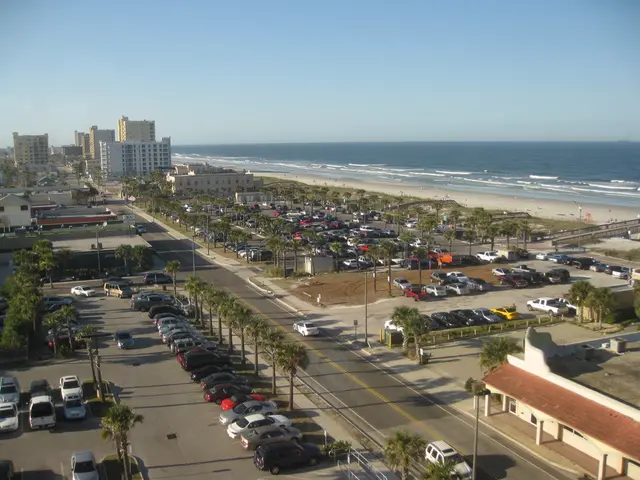Small businesses unite environmental and societal goals in their strategic approach
In the realm of infrastructure and manufacturing, sustainability is no longer an optional extra – it's a necessity. Two companies, Mott MacDonald and Mott Mobile Systeme, are leading the charge, integrating ecological, social, and economic aspects into their operations.
Mott MacDonald: A Holistic Approach to Sustainability
Mott MacDonald, a global consulting firm, has made sustainability a cornerstone of its strategy. By applying systems thinking to the built environment, the company develops innovative infrastructure projects that minimise environmental impacts.
One such project is the Mobile River Bridge and Bayway in Mobile, Alabama. The aim was to increase traffic capacity while minimising impacts on the local maritime industry and environment. Careful coordination with authorities ensured that environmental processes were streamlined, and infrastructure was upgraded responsibly[1].
Mott MacDonald also prioritises social sustainability. Mark Enzer, a strategic advisor at the firm, advocates for viewing the built environment as interconnected systems designed to benefit communities sustainably over generations. This social focus is evident in projects like the Living Lab initiative hosted by the Cambridge Institute for Sustainability Leadership, where Mott MacDonald plays a thought leadership role[2].
Economic sustainability is also a key focus. Projects like the Mobile River Bridge support regional economic vitality by improving transportation efficiency, reducing congestion, and ensuring safer routes for hazardous materials[1].
Mott Mobile Systeme: A Green Manufacturer
Mott Mobile Systeme, a medium-sized manufacturer of mobile stages and stage elements based in Tauberbischofsheim, Baden-Württemberg, has also embraced sustainability. The company optimised its production processes, using water-based paint systems and switching to LED lighting[3].
Mott Mobile Systeme's sustainability efforts aim to add additional momentum to the targeted transformation. The company covers 80% of its electricity demand through its own sources, relying on renewable energies such as photovoltaic systems and a highly efficient combined heat and power plant[3].
The company is also committed to reducing its carbon footprint. Important steps in this transformation include analysing the current status, defining clear, achievable goals, implementing effective measures, and involving all employees[4].
Mott Mobile Systeme's Managing Director, Jürgen Junker, emphasises a future-oriented and modern alignment, including ecological and social aspects[5]. The company has created three full-time positions for people with disabilities from the Caritas Workshops Alois Eckert within the company[6].
Transparent communication and continuous review of measures contribute to long-term success in the sustainability transformation[4]. Last year, Mott Mobile Systeme was nominated for the Environmental Award Baden-Württemberg, providing valuable impetus for other companies undergoing sustainability transformation[7].
In conclusion, both Mott MacDonald and Mott Mobile Systeme are setting examples for other companies by integrating ecological, social, and economic sustainability into their operations. Their holistic approaches strengthen their business models, delivering resilient infrastructure solutions and green manufacturing that align with global sustainability goals.
[1] Mobile River Bridge and Bayway project [2] Living Lab initiative [3] Mott Mobile Systeme's sustainability efforts [4] Steps in the sustainability transformation [5] Jürgen Junker, Managing Director of Mott Mobile Systeme [6] Mott Mobile Systeme and Caritas Workshops Alois Eckert [7] Mott Mobile Systeme nominated for the Environmental Award Baden-Württemberg
Read also:
- Stone mining has transformed the once renowned 'Sada Pathor' into a desolate, post-apocalyptic landscape.
- Revised Tax Policy for Motor Vehicles Pushed for Greater Eco-friendliness, Suggested by Court Auditors
- Switzerland conducts a public vote on the future of nuclear energy
- Notification of Intergovernmental Review for Grants under GGRF Programs: These involve Aid Listings 66.957 (NCIF), 66.960 (CCIA), and 66.959 ( Zero Emissions Technologies Grant Program, previously known as Solar For All)








